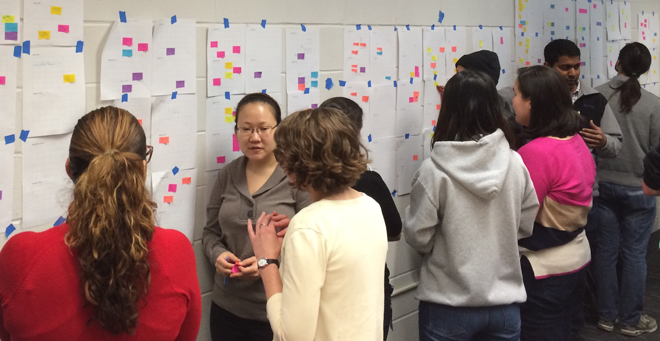
GSBS students discuss career options at a myIDP poster session, part of the career planning curriculum recognized by the AAMC Innovations in Research and Research Education Award. |
The Graduate School of Biomedical Sciences has received a 2019 Innovations in Research and Education Award from the Association of American Medical Colleges. The school’s submission, “Integrating Career and Professional Development in the PhD Curriculum,” tied for third place in the competition developed to highlight innovations that support the next generation of researchers.
“Graduate students often delay career planning until late stages of training. We innovated a new approach to integrate career and professional development directly into and across the span of training for all basic biomedical sciences doctoral students,” said Cynthia Fuhrmann, PhD. “Our curricular approach represents a fundamental shift in how career development is structured—from one-time, opt-in workshops, to lessons that build over time as part of the required curriculum.”
Dr. Fuhrmann, associate professor of biochemistry & molecular pharmacology, and assistant dean of career and professional development for the GSBS, led the design of curricular elements to maximize impact for career development and thesis research productivity. It includes new elements such as career-themed learning communities and job simulations. Initial development of the curriculum and the Center for Biomedical Career Development under Fuhrmann’s direction were supported by a BEST (Broadening Experience in Scientific Training) grant from the National Institutes of Health.
“When we began this project, the urgent need for stronger career development was prompting universities to begin investing in this area. Today, national organizations and funders are urging universities to integrate career development as a core element of PhD training,” said Fuhrmann. “Our approach leverages what has been learned in the emerging field of PhD career development, while at the same time turning the traditional model for PhD career development on its head.”
The award-winning projects were selected by a panel of leaders in biomedical research, education and training from AAMC-member institutions as well as AAMC staff. Entries were judged on creativity, impact and the feasibility of replicating the innovation.
“The innovative and collaborative spirit at UMass Medical School is reflected in our project,” said Fuhrmann. “It has been rewarding to see not only the significant growth of our students as our curriculum has evolved, but to also see other universities begin to move in this direction.”
The NIH BEST award enabled the GSBS to collect data to test the impacts of the new model and share lessons learned with other PhD training programs across the country. Annual surveys since the GSBS launched the career development initiative in 2014 have identified changes in student and faculty attitudes and actions indicative of culture change. Long-term outcomes will be assessed as the first cohorts to participate in the career development curriculum graduate and move into the scientific work force over the next few years.
Related stories on UMassMedNow:
Cynthia Fuhrmann dedicated to helping other scientists chart their own careers
GSBS, American Chemical Society collaborate to measure impact of individual development plans
GSBS Career Pathways Communities expose PhD students to new career options
Nature editorial recognizes novel GSBS career development program